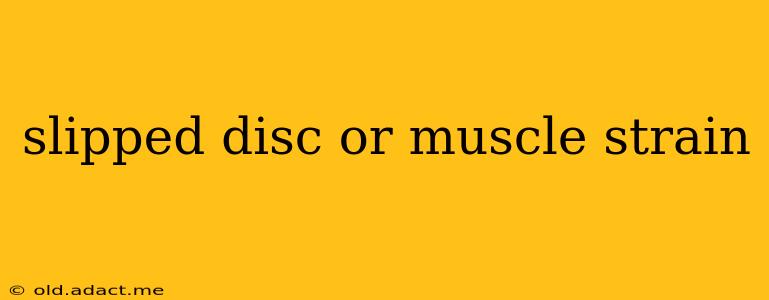Experiencing lower back pain? It's a common problem, and two frequent culprits are slipped discs (more accurately called herniated discs) and muscle strains. While both cause pain, they have different underlying causes and require different approaches to treatment. This guide will help you understand the key distinctions between a slipped disc and a muscle strain, empowering you to seek appropriate medical attention.
What is a Slipped Disc (Herniated Disc)?
A slipped disc, or more accurately a herniated disc, occurs when the soft, gel-like center of an intervertebral disc pushes through a tear in the tougher outer layer. These discs act as cushions between the vertebrae in your spine. When a disc herniates, it can press on nearby nerves, causing pain, numbness, tingling, or weakness that often radiates down the leg (sciatica). The location of the herniation dictates the specific symptoms experienced.
What causes a slipped disc?
Several factors can contribute to a herniated disc, including:
- Age: As we age, the discs naturally degenerate, becoming more prone to tears and herniation.
- Injury: A sudden injury, such as lifting a heavy object improperly or experiencing trauma to the back, can cause a disc to herniate.
- Repetitive Strain: Repeatedly performing tasks that strain the back, such as bending or twisting, can also contribute.
- Genetics: A family history of disc problems can increase your risk.
- Obesity: Excess weight puts extra strain on the spine.
What is a Muscle Strain?
A muscle strain, also known as a pulled muscle, is an injury to a muscle or tendon (the tissue connecting muscle to bone). Lower back muscle strains are common, often caused by overexertion, poor posture, or sudden movements. The pain is usually localized to the back and may be accompanied by muscle spasms, tenderness to the touch, and stiffness. Unlike a slipped disc, a muscle strain rarely causes radiating pain down the leg.
What causes a muscle strain?
Muscle strains in the lower back often result from:
- Overexertion: Lifting heavy objects, strenuous exercise, or sudden movements can overstretch or tear muscle fibers.
- Poor posture: Maintaining poor posture for extended periods puts undue stress on back muscles.
- Weakness: Weak core muscles provide insufficient support for the spine, making it more susceptible to injury.
- Improper lifting techniques: Failing to use proper lifting techniques significantly increases the risk of muscle strain.
Slipped Disc vs. Muscle Strain: Key Differences
| Feature | Slipped Disc (Herniated Disc) | Muscle Strain |
|---|---|---|
| Cause | Disc herniation pressing on nerves | Overstretched or torn muscle fibers |
| Pain Location | Localized back pain, often radiating down the leg (sciatica) | Primarily localized back pain; rarely radiates down the leg |
| Other Symptoms | Numbness, tingling, weakness in the leg or foot | Muscle spasms, tenderness to the touch, stiffness |
| Severity | Can range from mild to severe, potentially requiring surgery | Usually less severe, often resolving with conservative treatment |
How are Slipped Discs and Muscle Strains Diagnosed?
Diagnosing the cause of your lower back pain involves a thorough physical examination by a doctor or physical therapist. Imaging tests, such as X-rays, MRIs, or CT scans, may be used to visualize the spine and confirm a herniated disc or rule out other conditions.
How are Slipped Discs and Muscle Strains Treated?
Treatment for both slipped discs and muscle strains often starts conservatively with:
- Rest: Avoiding activities that aggravate the pain.
- Ice and heat therapy: Applying ice initially to reduce inflammation, followed by heat to relieve muscle spasms.
- Over-the-counter pain relievers: Ibuprofen or naproxen can help manage pain and inflammation.
- Physical therapy: Strengthening core muscles and improving posture can aid recovery.
More involved treatments for slipped discs may include:
- Epidural steroid injections: To reduce inflammation and pain.
- Surgery: In severe cases where conservative treatments fail to provide relief.
Can a muscle strain lead to a slipped disc?
While a muscle strain doesn't directly cause a slipped disc, chronic muscle imbalances and poor posture associated with untreated muscle strains can put increased stress on the spine over time, potentially increasing the risk of disc herniation.
How long does it take to recover from a slipped disc or muscle strain?
Recovery time varies depending on the severity of the condition and the individual's response to treatment. Muscle strains often heal within a few weeks with conservative care, while recovery from a slipped disc can take several months or longer, especially if surgery is required.
This information is for general knowledge and should not be considered medical advice. If you are experiencing lower back pain, it's crucial to consult a healthcare professional for proper diagnosis and treatment. They can accurately assess your condition and recommend the most appropriate course of action.
